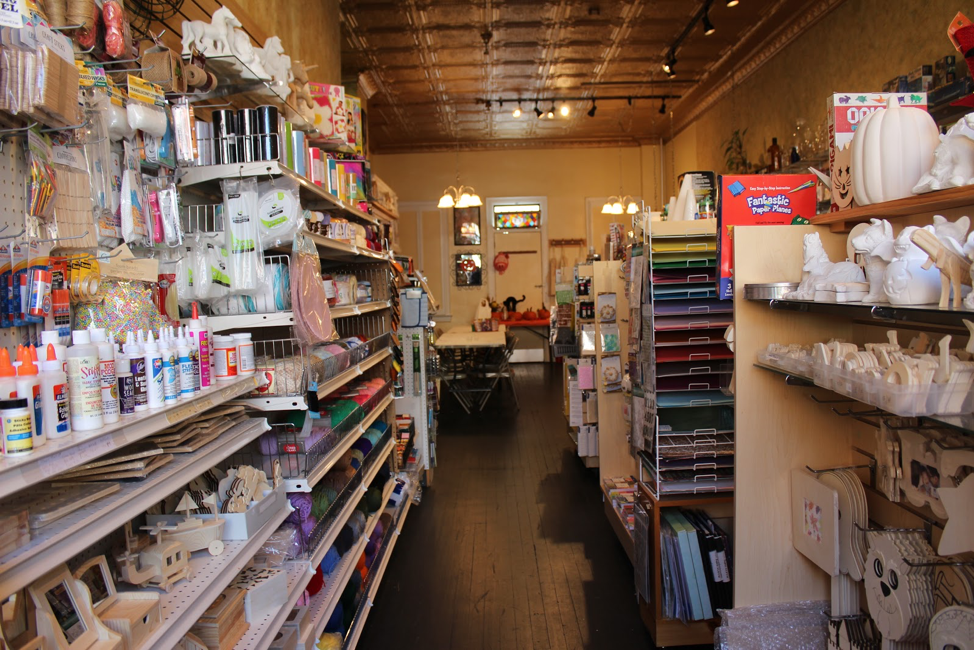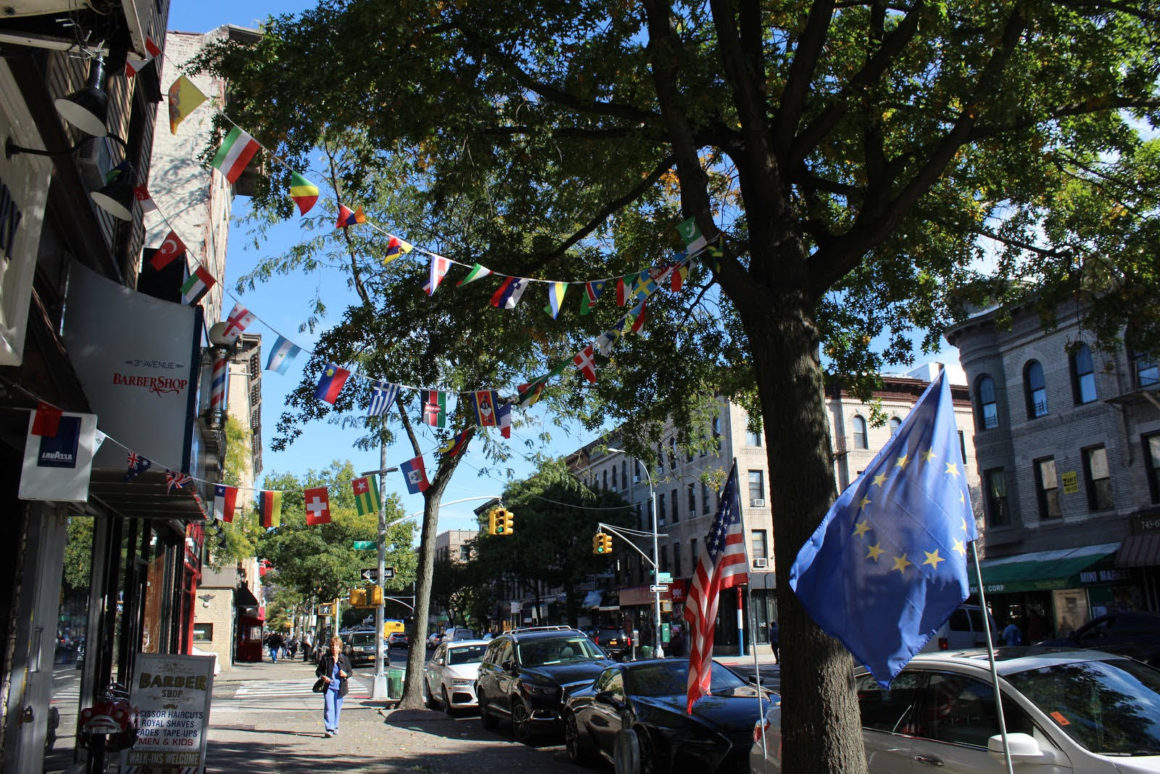Twelve miles south of Manhattan is a commercial strip seemingly stuck in time, where small-businesses still make up most of the shops, and there’s not a high-rise in sight.
Bay Ridge’s tree-lined Third Avenue is as diverse as the area itself. Shoppers pour in and out of Mid-East Bakery & Grocery, Norma’s Arts & Crafts Supplies, and Things on Third, which suggests that all is well.
But life along Third Avenue, especially for merchants, is changing. Mom-and-pop stores, the backbone of commerce in neighborhoods like Bay Ridge, are facing stiff competition from online retailers like Amazon – almost 6,000 stores across the country closed in the first three months of 2019 alone, which is more than the number of stores that closed throughout all of 2018. And while the business owners do not use the word fear, they do talk about survival. The question is: how?
One suggestion that is pitting merchants against each other is paying a fee into a communal pool that can be used for sanitation, beautification, streetscaping, and advertisements. Some believe it will restore Third Avenue to a time when everyone shopped locally. Others disagree. But what everyone acknowledges is that they have to do something if their livelihoods are to be saved.
“In the last two years, we have seen the retail stores closing down a lot,” said Lolita Andrade, a local real estate broker who has lived in the area for decades. “Small boutiques, they’re closing down and opening up another one. They’re trying, and they can’t survive.”
In fact, as retail shops close, they are being replaced by service businesses you can’t get online – nail salons, spas, and pharmacies. This is leaving the remaining merchants debating the wisdom of what is known as a Business Improvement District, or BID.
A BID is essentially a tax on property owners in a specific area that is meant to make the street more attractive to shoppers. The services a particular BID provides depends on what the people within the district think would most add to it. They’re run by an elected Board of Directors who ultimately decide how much money to collect from property owners and where that money goes. But before the BID becomes official, a group of residents and business owners form a steering committee that helps push the effort forward.
If the majority of people on a particular street or neighborhood votes for a BID, everyone has to pay the predetermined amount of money each month, even if you don’t necessarily agree with it or want its services – which is at the heart of Third Avenue’s current divide.
Like Andrade, some merchants think the services this extra tax provides will help bring in new businesses, increase foot traffic, and benefit everyone. While she feels the BID will help Third Avenue as a whole, supporting it is even more personal for Joseph Riley, executive director and CEO of the Guild for Exceptional Children (GEC) – a non-profit that serves about 700 developmentally disabled children, adults, and elderly people mostly in Bay Ridge.
The individuals Riley serves at the GEC “don’t shop online, they actually like to go to stores, and then my staff go in there with them. They’re good customers,” he said. “That’s one of the reasons why I got involved in the BID.”
But others do not see the benefit. Paying another tax is foolish, they say, especially when they’re already struggling to make ends meet in rent alone.
The BID, said Norma Visconti, owner of Norma’s Arts & Crafts Supplies, “would be the worst thing they could possibly do.”

Their evidence, say other opponents of the BID, can be found two blocks away on Fifth Avenue.
In 2007, that avenue’s merchants approved their own BID. Critics of the Third Avenue BID point out that rather than remain constant, the tax on their neighbors has gone up as needs increase in cost – though it also briefly went down one year. According to the Fifth Avenue BID’s tax filings, its revenue from the tax went up by $89,000 between 2014 and 2015, meaning each property owner’s monthly tax went up, as well. From 2015 to 2016, the overall amount of money received from property owners increased by another $10,500, but it dropped by $3,201 the following year. The fees for the Third Avenue BID have not yet been set but according to members of the steering committee, it will be about $75 a month for the first year.
Critics also say they haven’t seen a difference on Fifth Avenue since its BID started. It is a view echoed by Charles Arnone, owner of Choc Oh! Lot Plus, Fifth Avenue’s chocolate and candy shop. He said he preferred the more casual way of helping one another through the avenue’s now-defunct merchants’ association.
“It was so much nicer then because it was more like a get together once a week, not even once a week, once a month, but it was just meeting or seeing local businesses because we all participated,” Arnone said. “Now, it’s like the BID is taking care of everything, and they’re telling us what to do. They’re charging us thousands of dollars a year for them to have a car go up and down the street [and] have somebody sweeping in front of the store. To me, it’s just a waste of money.”
The Fifth Avenue BID does have its fans, however.
Peter McPadden, who works at Legend’s Sporting Goods, thinks it has encouraged merchants to work together, be more organized, and communicate better. The store’s owner, Peter Lanza, agrees that the BID has made some difference on the avenue – cleaner streets, prettier holiday lights. Though there is one caveat, he said: retail is dying regardless, so it hasn’t helped as much as it probably could’ve.
“Retail has really hurt, it really has, and this neighborhood is small business,” McPadden said.
The case for shopping in person rather than online is simple: buying from someone who knows you, your name, your family, and your tastes. Not through an algorithm but through a relationship.
“Online business is a problem that we all contend with in every borough, but people like brick-and-mortar for the service,” said Dennis Monier, owner of Tops Restaurant and Bar Supplies on Third Avenue. “Most customers will pay a dollar more, a dollar less, doesn’t matter, as long as they have the service, and that’s what we’re supposed to provide more than anything else as a neighborhood business.”
Bob Phibbs, CEO of the Retail Doctor, a New York-based retail consultancy, feels how a small-business owner treats you when you’re in their store – whether they greet you, smile at you, or thank you on your way out – can make all the difference in the world. “People go online to buy,” he said. “They go in a store to discover.”
But even with the clear benefits of an in-person shopping experience, online retail sales are climbing. In the last year, they went up 14.2%, according to the U.S. Census Department.
Brick-and-mortar stores have been hit especially hard this year, considering that 5,994 stores closed just between January and March 2019. This stark retail decline is plaguing small businesses everywhere, and on Third Avenue, they’re looking for a way to stay afloat.
Instead of creating a BID on Third Avenue, a couple of the merchants have found another solution to the problem, one that’s been there all along: the Merchants of Third Avenue.
The organization, similar to the one that Arnone preferred on Fifth Avenue, essentially does what a BID would do, but the annual membership dues are optional and substantially lower (about $250 in total). Granted, some business owners on the avenue find this setup a bit unfair because while they may contribute financially, those who don’t still benefit all the same. Nonetheless, Visconti, the arts and crafts supplies store owner, thinks it’s the best option for Third Avenue.
“We could do it together,” said Visconti. “We don’t need any outside help. [But] if we do have outside help, they can’t go into our pockets. It’s impossible. How do you go into a pocket that’s empty?”
The organization has been run by a group of volunteers for the last 25 years. Some have come and gone, but others have remained loyal. After all of these years, the volunteers who have stuck around want to retire, so Third Avenue is looking toward a BID to fill the gap that they would leave behind. Visconti said she asked them to hand the organization over, fully intact, to merchants who want to take the reins, rather than enacting a BID.
Visconti insisted that all small-business owners need to do to survive is work together, and they don’t need a BID to do that. They could make booklets promoting sales at the different stores along the avenue; post advertisements in and around the neighborhood and on social media; and offer a free glass of wine to locals as they browse the shops.
The vote on the BID has not yet been scheduled, and the steering committee is still talking up the extra tax. The merchants, meanwhile, remain divided – at least as far as the BID is concerned.“Third Avenue can become Third Avenue again. We can survive if we just don’t get hit with anymore extra amenities. We can’t afford it,” Visconti said. “It’s our backs up against the wall. We’re the little people trying to fight.”


Leave a Reply